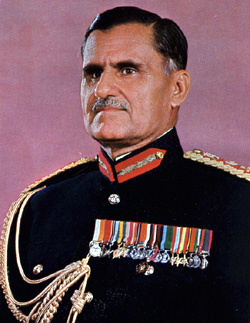Army Chiefs
General Tapishwar Narain Raina
- Details
- Created: 12 October 2006
- Written by 1973-1975
- Hits: 12337
PVSM
COAS, 15 Jan 1973 - 31 May 1975
Infantry, 11 Gorkha Rifles and 2 Dogra
General Tapishwar Narain Raina assumed charge of the Indian Army, as the 10th Chief of Army Staff, on 15 May 1975. His early education was done at Ludhiana, Punjab because his father - Pandit B.N. Raina - was posted there as a head postmaster. Commissioned into the Kumaon Regiment on 12 April 1942, he took part in the Burma Campaign of World War II and was Mentioned–in–Dispatches for gallantry. During his Burma campaign, he was injured a grenade accident which resulted in the loss of an eye. He had a glass eye in place for the rest of his career in the Indian Army.
He commanded the 14th Kumaon (now the 5th Mechanised Infantry) from September 1957 to September 1959. He then commanded the 114th Infantry Brigade from 1959 to 1962, during the Indo-China conflict of 1962 and was awarded the Maha Vir Chakra (MVC) for showing great courage and leadership qualities in organizing the defences of Chushul. He later became the Brigadier General Staff of the 33 Corps in Siliguri, West Bengal. He also served as the Deputy Adjutant General at Army Headquarters and as GOC of the 25th Infantry Division.
In 1971, he was the GOC II Corps in the Khulna sector. He was awarded the Padma Bhushan - India's third highest civilian honour - for his contributions during the 1971 Indo-Pak War. He was General Officer Commanding–in-Chief of Western Command from 1974 to 1975. He was the Chief of Army Staff from 01 June 1975 to 31 May 1978. He was the Colonel of the Kumaon Regiment and the Naga Regiment from 16 May 1971 to 31 May 1978.
During his tenure as Army Chief, the Central Government led by Prime Minister Indira Gandhi imposed national emergency in India. Before the imposition of the emergency, it is believed that Prime Minister Gandhi asked for the Indian Army's support in the venture, but General Raina told the Prime Minister that the Indian Army would not be used to further her ends but obey only those orders of a legally construed government. This was considered a crucial moment that kept the Indian Army out of politics at a critical juncture. He retired on 31 May 1978, after completing more than 36 years of service to the Indian Army and the nation. He was married to Marie Antoinette Raina, a French woman. He was appointed as the Indian High Commissioner to Canada in February 1979. He passed away on 19 May 1980 in Ottawa, Canada during his tenure as the Indian High Commissioner.

